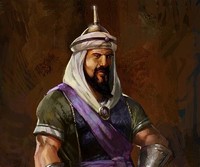Facts about Saladin
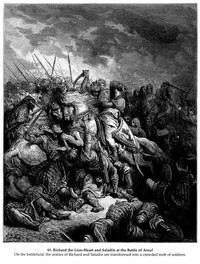
At Arsuf, when Richard lost his horse, Saladin sent him two replacements.
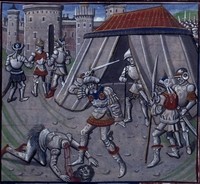
Raynald of Chatillon, in particular, harassed Muslim trading and pilgrimage routes with a fleet on the Red Sea, a water route that Saladin needed to keep open.

Saladin was born in 1138 into a Kurdish family in Tikrit and was sent to Damascus to finish his education.

When Richard was wounded, Saladin offered the services of his personal physician.

Saladin consulted his council, and these terms were accepted.

The name Salah ad-Din means "Righteousness of Faith," and through the ages Saladin has been an inspiration for Muslims in many respects.

In 1188, Saladin released Guy of Lusignan and returned him to his wife Queen regnant Sibylla of Jerusalem.

Nur ad-Din and Saladin were headed towards open war on these counts when Nur ad-Din died in 1174.

The noble Saladin appears in a sympathetic light in Sir Walter Scott's The Talisman (1825).

According to the account of Imad al-Din, Saladin watched the executions “with a glad face.” The execution of prisoners at Hattin was not the first by Saladin.

Saladin's relationship with Richard was one of chivalrous mutual respect as well as military rivalry.

Of Kurdish ancestry from Mesopotamia, Saladin lived for ten years in Damascus in the court of Nur ad-Din, where he studied Sunni theology.

Saladin apparently hoped that the Crusader kingdom would remain intact as a buffer state between Egypt and Syria, until he could gain control of Syria as well.
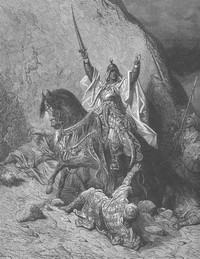
Saladin spent the subsequent year recovering from his defeat and rebuilding his army, renewing his attacks in 1179 when he defeated the Crusaders at the Battle of Jacob's Ford.

When the caliph died in September 1171, Saladin had the imams, at sermon before Friday prayers, declare the name of Al-Mustadi—the Abbassid Sunni caliph in Baghdad—in Al-Adid's place.
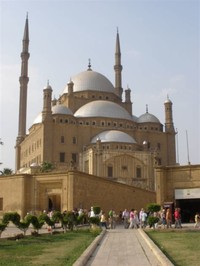
Saladin first fortified the Citadel of Cairo (1175-1183), which had been a domed pleasure pavilion with a fine view in more peaceful times.

Modern Muslim rulers have sought to capitalize on the reputation of Saladin.
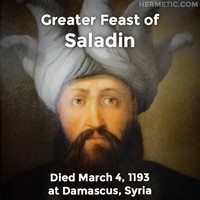
Saladin died on March 4, 1193, at Damascus, not long after Richard's departure.

A governorate centered around Tikrit in modern Iraq, Salah ad Din, is named after Saladin, as is Salahaddin University in Arbil.

Saladin also conquered Yemen, took over Damascus, and began conquests of Syria and Palestine.

Saladin captured Raynald de Chatillon and was personally responsible for his execution.
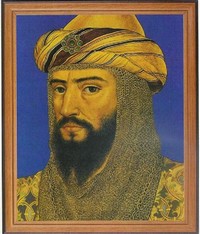
Saladin, Salah ad-Din, or Salahuddin al Ayyubi (so-lah-hood-din al-aye-yu-be) (c. 1138 – March 4, 1193), was a twelfth century Kurdish Muslim general and warrior from Tikrit, in present-day, northern Iraq.

Saladin is buried in a mausoleum in the garden outside the Umayyad Mosque in Damascus, Syria, and is a popular attraction.

Two days after the Battle of Hattin, Saladin ordered the execution of all prisoners of the military monastic orders by beheading.
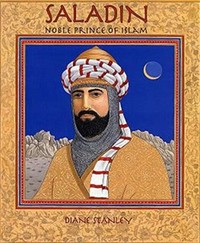
Saladin is renowned in both the Muslim and Christian worlds for leadership and military prowess, tempered by his chivalry and merciful nature during his war against the Crusaders.

Later, Saladin went with his uncle, Shirkuh, a lieutenant of Nur ad-Din, on campaigns (1164, 1167, 1168) against the Fatimid rulers of Egypt.
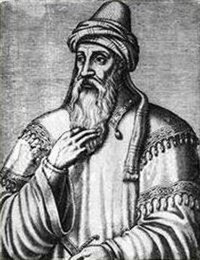
Now Saladin ruled Egypt, officially as the representative of Nur ad-Din, who recognized the Abbassid caliph.

Saladin is also regarded as a Waliullah, which means the friend of God to the Sunni Muslims.

The city of Jerusalem also fell to Saladin, causing the Third Crusade to gather (1189) and come to the Holy Land to try to recover Christendom’s holy city.

Instead the mausoleum now has two sarcophagi: one empty in marble and one in wood containing the body of Saladin.
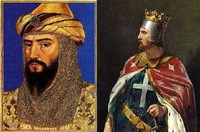
Richard, in his turn, suggested to Saladin that his sister marry Saladin's brother—and Jerusalem could be their wedding gift.

Immediately after Nur ad-Din's death, Saladin marched on Damascus and was welcomed into the city.
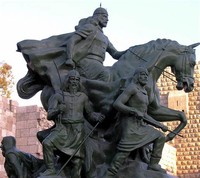
Saladin revitalized the economy of Egypt, reorganized the military forces and stayed away from any conflicts with Nur ad-Din, his formal lord.

The defeat at the battle of Hattin and the fall of Jerusalem prompted the Third Crusade, financed in England by a special "Saladin tithe."



